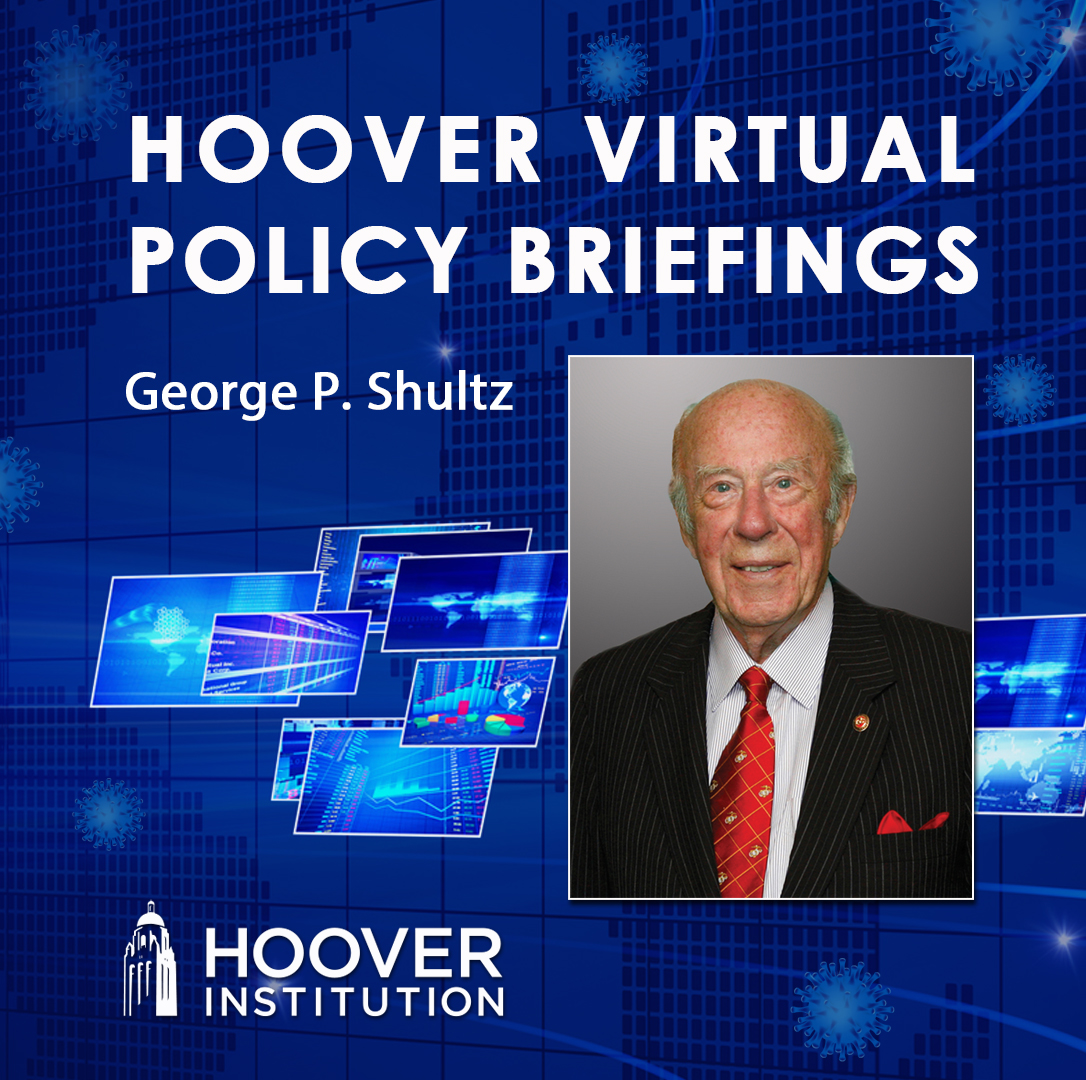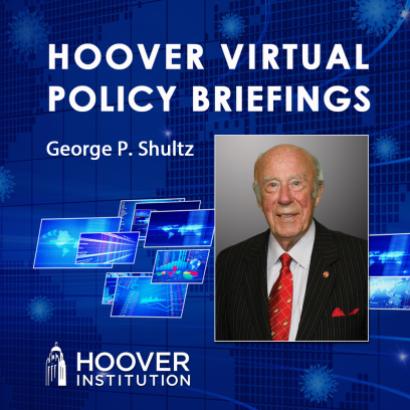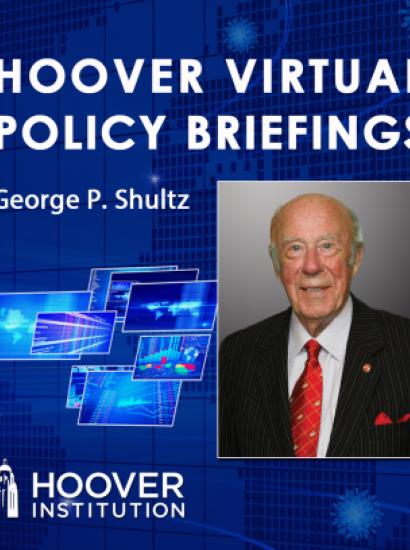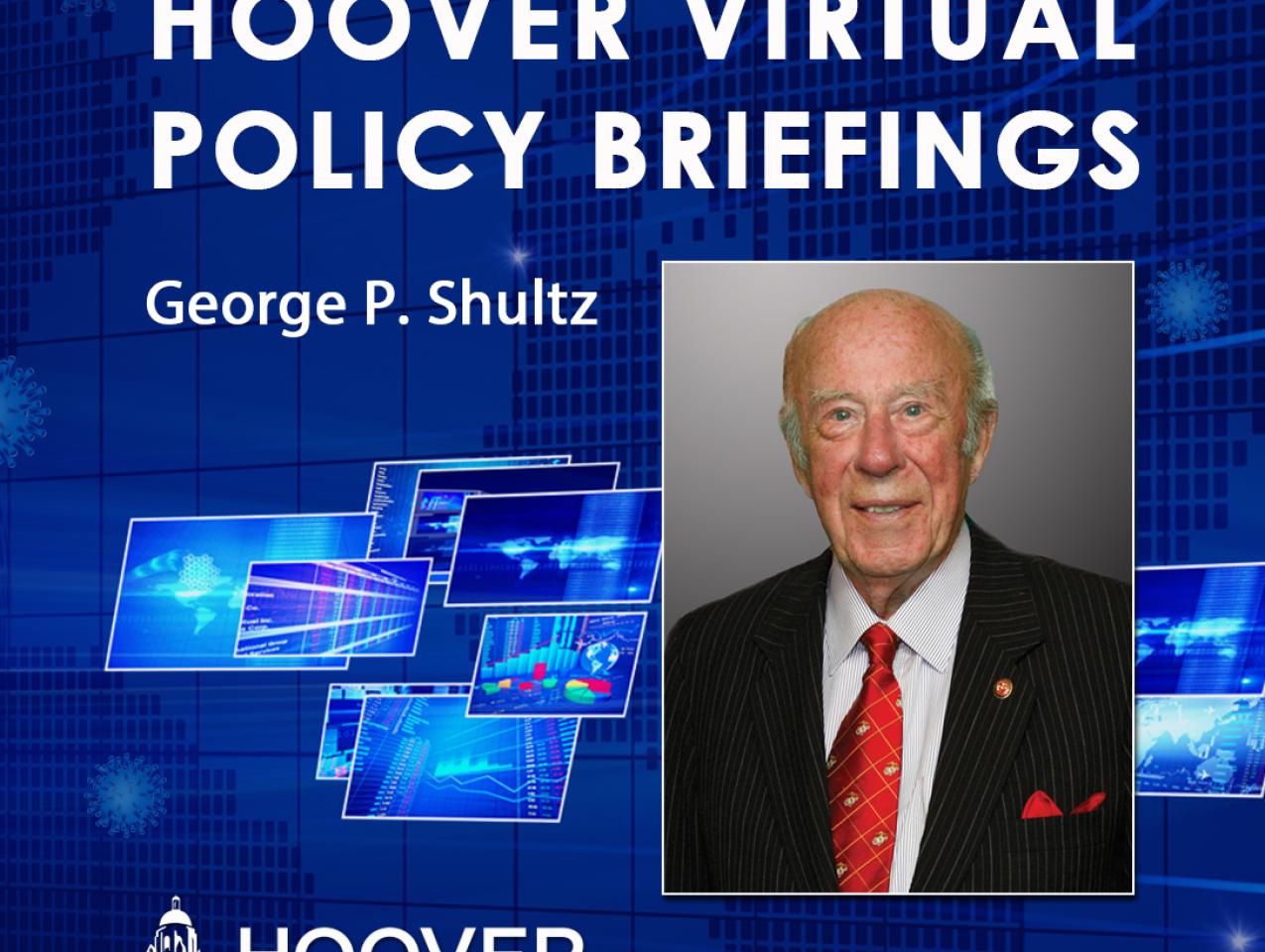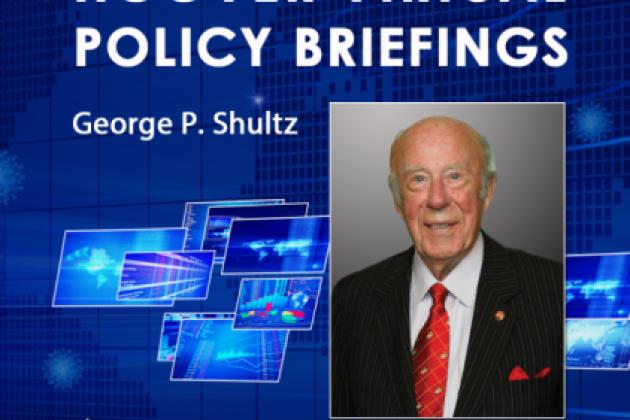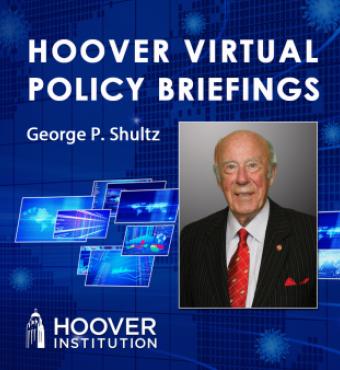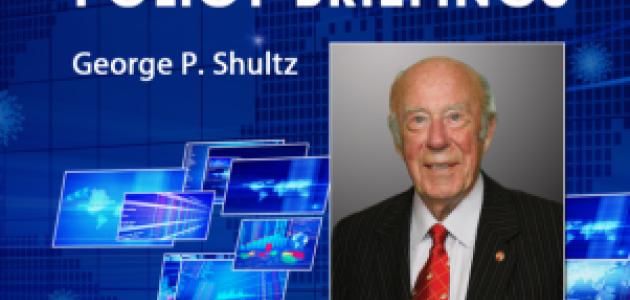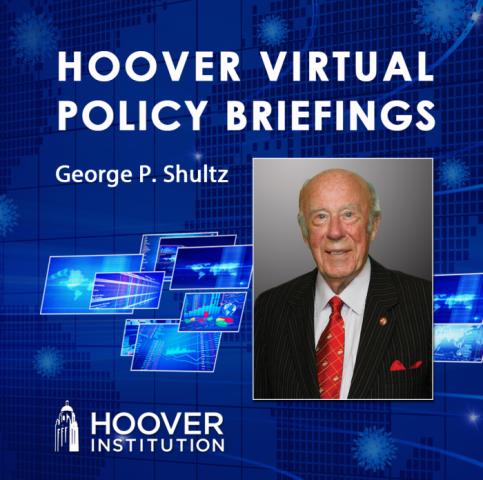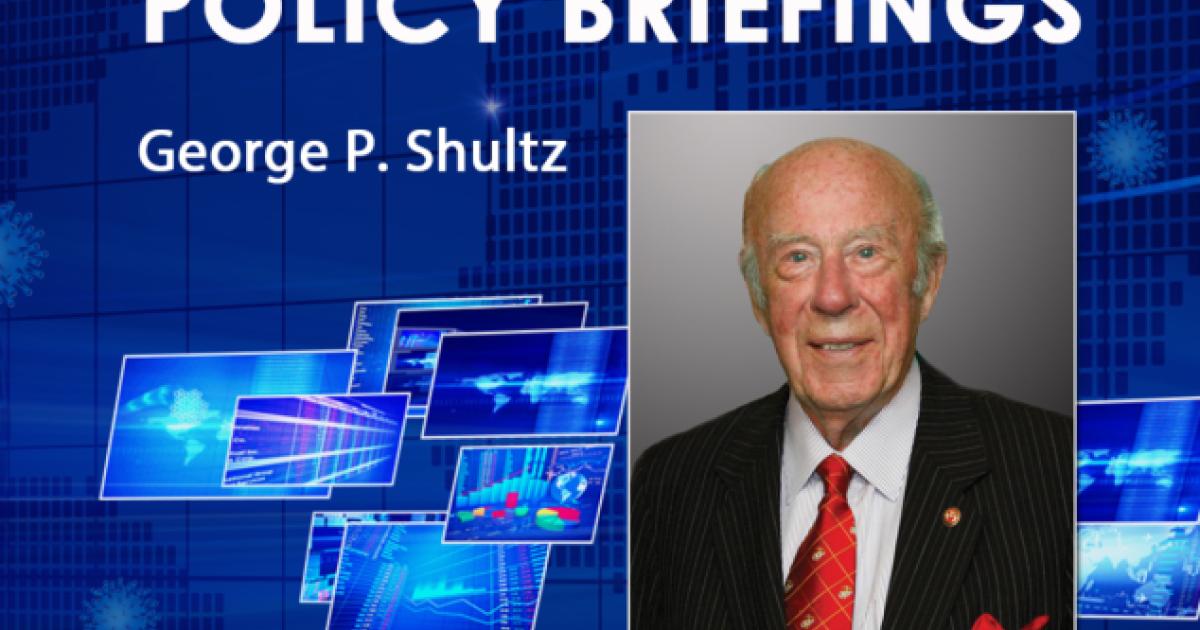- Politics, Institutions, and Public Opinion
The Hoover Institution presents an online virtual briefing series on pressing policy issues, including health care, the economy, democratic governance, and national security. Briefings will include thoughtful and informed analysis from our top scholars.
GEORGE P. SHULTZ: Learning From Experience
Tuesday, July 21, 2020 at 11AM PT/ 2PM ET
WATCH THE BRIEFING
ABOUT THE FELLOW
George Pratt Shultz has had a distinguished career in government, in academia, and in the world of business. He is one of two individuals who have held four different federal cabinet posts; he has taught at three of this country’s great universities; and for eight years he was president of a major engineering and construction company.
Tom Gilligan: Welcome to the Hoover virtual policy briefing series. I'm Tom Gilligan, Director of the Hoover Institution. For more than a century, the Hoover Institution and world renowned library archives have been collecting knowledge and generating ideas that support the pursuit of freedom and endeavor to improve the human condition. We've been able to occupy an eminent place in the think tank landscape by maintaining a focus on scholarly and empirical research that asks bold questions, offers powerful solutions for policymakers, and advances ideas to improve people's lives. These briefings are one of the many ways we're able to share some of the important work coming out of the institution. Thank you for joining us today.
We'll be taking audience questions and I want to encourage submitting yours using the Q&A button located at the bottom of your screen.
Today we have a special briefing for you. There are very few people anywhere in the world who have had a front row seat and played such a significant role in determining the outcome of so many major historical events. And although he needs no introduction, I want to tell you that George P. Shultz has had a distinguished career in government and academia, and in the world of business. He is one of two individuals in American history who have held four different federal cabinet posts. He taught at three of the country's great universities and for eight years he was president of a major engineering and construction company. In 1955, he served as a senior staff economist on President Dwight Eisenhower's Council of Economic Advisers. In 1969, he was appointed Secretary of Labor by President Richard Nixon. In 1970, he became the first director of the newly formed Office of Management and Budget. In 1972, he was named Secretary of Treasury, and from 1982 to 1989, he served the Secretary of State for President Ronald Reagan. Hoover is privileged to have George, as the Thomas W. and Susan B. Ford Distinguished Fellow. George, thank you very much for being with us today. We're honored that you're here.
George P. Shultz: I'm glad to be here and having this conversation.
Tom Gilligan: Thanks George. The pandemic is an example of how some of the most consequential challenges that we face here in the United States are also based by other countries around the world too. What can we learn from historical experience about how to address such global problems?
George P. Shultz: I think we learn that much of our well being depends on our relationships with other countries around the world. We're not alone. We are surrounded by other countries with other populations and desires and climates and so on. But when we reach out and try to have global consensus, we tend to do better. I'll give you an example. At the end of World War II,
the economy had been shredded before the war. So the United States convened a big conference at Bretton Woods. There were 40 countries. Of it came the IMF to wear currency problems. International Bank for Reconstruction and Development, which is the World Bank to the development problems. And again, the General Agreement on Tariffs and Trade to get tariffs down and trade barriers down now morphed into the World Trade Organization. That was not the United say to tell people what to do, is the United States convening something and developing a consensus on what to do. That's what works.
Tom Gilligan: George I know one of the projects you've led here at the Hoover Institution is project titled Governance in Emerging New World. It included a number roundtables and panels on campus that talked about and studied the kind of challenges that are facing us. What were the highlights? You can share from that experience with the audience.
George P. Shultz: Do you have half an hour.
Tom Gilligan: How about five minutes.
George P. Shultz: We start with the notion that the world is on a hinge of history. The future is going to be different from the past in major ways. Let me put this in the context of what happened after World War II. They were also an engine history. And when Truman, Acheson, and Marshall and Clayton look back, what did they see? They saw two world wars. The first one was settled in rather vindictive terms that helped lead to the second. They saw 22 million people were killed in the Second World War, they saw the Great Depression. They saw the protectionism and currency manipulation and aggravated and they said, “What a crummy world.” But after World War I, we walked away from it. After World War II, they said, “We're part of it, whether we like it or not.” So then comes along the Bretton Woods, meaning that I mentioned earlier, we got in that lane, the economic foundation or what happened afterwards and then came the Marshall Plan. Was not us telling people what to do, it was us saying to say France, your country is demolished, what's your plan for picking it up and it looks sensible openness. And then you had the Cold War and NATO. NATO is a terrific organization I work with very closely. And so, this was a consensus building and I think it's fair to say then when the Cold War came to an end, there had been built a security and economic commons in the world. Everybody benefited from. That common sense now eroding. And things are coming at us that are different. For example, the demography of the world is changing very rapidly. All developed countries have low fertility and rising longevity. So the structure of their population is changing radically. Most are losing working age population. Some rapidly, that's to Russia, Germany, Japan, China. That's very important because your rate of increase in GDP is a rate of increase in the labor force plus the productivity labor force. If the labor force is going nowhere and it’s hard to have much of a GDP. United States, Canada and Australia are exceptions to this rule because all three immigration countries. We are not losing working age population or demographic trends of the same at any rate. We see that taking place huge demographic change the world population will continue to increase because of the high fertility in Africa mostly. But the African countries are ones where there are not too many job opportunities and where they’re agriculture oriented and climate change. Yes, there is climate change, it's coming out as fast. Producing drought conditions. So people will move. World is not ready for large scale movement of people. That's a big problem that’s looming. And we have new technology, artificial intelligence, very powerful development. And we have 3D printing which people haven't gotten to yet but these are for little projects, big projects. I have a grandson, a smart kid, and the other night, he was over and I saw him sitting there and he had a little 3D printer that he bought for $70 and he was making the parts for the motorboat that he had on the lake. We can't beat it. But there’s gigantic projects. And I think we're going to see a major deglobalization as it's possible more, and more to build the things you want where you are, and that's a big thing that's happening. Across these climate change, which is accelerating, and you read about all that stuff going on in the Arctic. You see how rapidly that's all melting. It has big implications. So we have climate change coming and we have new weaponry. That's let alone atomic weapons.
Tom Gilligan: Yeah.
George P. Shultz: New weaponry. I can't help but think about that. Radium drone that one some distance undetected and that Saudi Arabian major facility right on the button. Any fixed installation is vulnerable anywhere drones are cheap. They can be printed out with very powerful explosive
Tom Gilligan: Yeah, yeah.
George P. Shultz: Got a different world here. We were a different world. We have to start figuring out what to do.
Tom Gilligan: Yeah, George, let's, let's just dig deeper into some of these issues. I know that you've studied the energy picture extensively here at Hoover and with your colleagues at Stanford and MIT. We have a question from Robert King, which is global climate change is our biggest problem to be solved. How do we collaborate with China, and I presume other major energy users, to help solve this problem?
George P. Shultz: Well, I think China is on right on the willingness to do things. They have been over here. Big Chinese delegating came to Hoover not long ago, when we talk to them, they would, what I have been advocating and it's beginning to get somewhere is a fee on carbon. With the money collected from the fee rebated to the population. So there's no physical direct connection with it. So it's not like a regular tax. And also, since you would get the same amount of money to everybody with a social security card, it would be in a sense, sort of progressive tax implications. And then we would put a fee on any import and the fee would be on whatever its carbon cost has it. So right equalize competitively here and abroad. And I think this were implemented, there's a lot of evidence that really would work and help us out of this. But at the same time, then we got to keep up strong support for energy R&D. It's amazing really what these spaces have. As you said, I've been exposed to what Stanford is doing and what MIT is doing. The great improvements in solar energy, for instance, are not an accident. This is R&D. And many other examples and things that people are working on. So I think we do these two things energetically. We'll get there.
Tom Gilligan: Great. If you just join us on Tom Gilligan and this is the Hoover institutions virtual policy briefing with George Shultz. George, you mentioned demographics. First, we started talking about the new changes in the world. Given demographics and technology, how should the United States approach Russia now. The demographics in Russia are really going in a very bad direction. What's the importance for US, Russia relationships?
George P. Shultz: Well, Russia and China are two important relationships and in our program we had one with China that we've had one with Russia where people who are very knowledgeable came. I presented papers and we discussed them. Maybe, remember we did it over the Annenberg Auditorium. We had some riveting discussions there. Then we're going over the big Hauck Auditorium, we just announced on campus that we're going to have this discussion and the place would be full. Many people have an appetite for this. So here's Russia. Russia has a small economy. Size of Italy has income per capita like Portugal. And others. It's got a very poor economy. Devote the resources mainly to the military. And it's formidable. It has a big nuclear weapons storehouse, as well as other things. So you got to worry about them. But what I would do is sort of do the same thing that I did before, when Ronald Reagan and I took office. The Cold War was as cold as it could get. They had invaded Afghanistan, the Soviet Union and President Jimmy Carter cut off all relationships. Zero, nothing. So that's what we inherited and I had been when I was Secretary of Treasury. I had been in charge of economic relations with the Soviet Union. Who I knew quite a few of them. I've been to Moscow a few times and made some deals and worked and some really riveting experiences. So it didn't seem right to me. Anyway, I got permission somehow for the ambassador to come over once a week and our idea was we stuck to it. If we see a little weed like to get it out. We don't need any more problems. So by some chance, I was in China. I got back to Andrews Air Force Base. I was lucky to land because it was snowing, snow all day Friday, snow Friday night. Started Friday morning, Saturday morning still snowing. Our phone rings, it's Nancy. She said, how about you and your wife come over and have supper with us at the White House. My wife and I go over to the White House, and they're sitting around, and they start asking me about these Chinese leaders, what are they like? Do they have a sense of humor? Can you find the bottom line? And so on. Then they know I dealt with the Soviet so they started asking me about them. And I'm telling you about different guys and their style. And I'm sitting there and I'm saying to myself, you know this man has never had a real conversation with a big time communist leader. He's dying to have one. So I said to him, “Mr. President, Dobrynin coming over here next Tuesday at five. What if I bring him over here and you can talk to him.” And the President said that's a good idea, and only take about 10 minutes, all I want to tell him about this new leader and drop off and just succeed president. It's interesting, in a constructive conversation. I'm ready. Wow, that was a blockbuster. Nobody else in the government knew that was how the President thought that was his gut, I can see he and Nancy had talked it over. So, riding back and we were there for about an hour and a half. We talked about Soviet Jewry, and what generalizations he had, places, names, incidents. We talked about arms control, of course, we also talked a lot about the Pentecostals that rushed into our embassy, and the Carter years, and they were still there. So going back to the State Department with the brand. And we said, let's make that our special project. We work on it. And after a while, each stage features paper back and forth, but I got it when I thought it was pretty good. And I took it over to the President. And I said, Don't call in your lawyer so poke holes in this, but I think with all this background. If we get the Pentecostal sweep the embassy, they will be on to go home and eventually emigrate. Roll the dice and they did get to go home and then they were allowed to emigrate, not only the ones who are in the embassy going, but about 50 all their families. There was a giant event. Press one to know what happened? How did it happen? Ronald Reagan never said a word. He said during negotiations, he said “I just want something to happen. I won't say a word.”
Tom Gilligan: Yeah.
George P. Shultz: Well, I feel, there are two little elements of trust that came out of that one. One was he saw that you could make a deal with the Soviets, and they would carry it out and they saw the same thing. They knew how tempting it is for an American politician today to say look what I did. And he said he wouldn't do it, and he didn't. You can trust him. And all these things I think something to remember is trust is the coin of the realm. Once you're trying to do things, develop trust.
Tom Gilligan: Yeah. You're listening to Hoover distinguished fellow George Shultz. You can find more research by Hoover fellows at Hoover.org. George, you were around at the beginning in the end of the Cold War, and I have a lot of questions from audience members, one who informed us that he's a grateful air force officer deal detailed estate during your tenure, but they all ask the same question, and that is, are we in a new cold war with China, and what can we do to minimize the possibility of military conflict with China going forward.
George P. Shultz: Well, we're saying we're heading that way. But I don't think that's necessary. Yes, China has done a lot of things that we don't like. So we can go at them from the outside in the way we're now doing or we can do it from the inside out. I found when I became Secretary of State, much to my surprise, our relations with China were lousy. So I went over to Beijing and I said the dung Xiaoping, who is the leader, and my counterpart ,Yun Chen. I said, you put on the table everything you want to talk about, I’ll put on the table everything I want to talk about and will make an agenda out of that, and we'll work our way through that agenda. And I’ll agree to come here at least once a year. You and Chen come to the US at least once a year. We meet in international meetings about three times a year or less. Every time we have one of those let’s take three hours just for us and our interpreters, no publicity. Nothing, just two people working at this agenda and we worked through a lot of problems. So I think I would try to do something like that. I don't know. But I had three encounters with them. One was we had a Track II going and we were in Beijing and he was known to be the coming president, and he was known to be, but he wasn't president yet. And he gave a dinner party for us. And I sat next to him at the dinner party. And I said to him, when you go to Washington, why don't you stop in San Francisco? We've got a Chinese American mayor's doing a good job and you’ll have a good time. And he said, well, I've already said I would have to go to Los Angeles. I can't do it. But if I came there, but I really want to do, is come down to Stanford. Because we're around there, there's something going on there you call Silicon Valley, and I'm going to find out about it. And the only way to really understand anything is to talk to human beings on the other end. That was an interesting insight into how the man goes about things, then we had the Sunday Land Summit, you remember that the Obama years. Well, he announced that he was going to come a day early and bring his wife. In other words, he was saying I want get to know you privately and develop a relationship where we can talk candidly and quietly together. My wife, Charlotte, who knows all about protocol gets an SOS from the State Department where she was going down to Orange County Airport, whether he was going to come in and help out. There is no federal official there to meet the incoming President of China. The first lady sends word that she can’t come at all because there's a birthday of one of her children. So, Charlotte sends a SOS to Jerry Brown, who was our governor and Jerry comes shortly, so at least somebody met him. The next day, the ruler of China close his heels. Charlotte entertainment the First Lady. So what she’s like, oh, she's an impressive woman, she's interested in everything, very fashionable and she has an opera quality voice, who, if they have given her a stage appearance, she’d be more popular than her husband. In other words, it was a team. And that's a big missed opportunity. Another occasion our Track II is meeting in Washington and the top Chinese guys get Henry Kissinger on the side. And they say, we're very worried about the North Korea nuclear weapons program. And we think we ought to work with you on it, quietly. Oh, and here's a couple people on each side exchange ideas back and forth. We don't want to see where we might go and where we might line up. But if they said this is something I've got to be quiet. No publicity. Month or so later I see our Secretary of State leaving Beijing, saying, I just got an agreement to work on North Korea with a Chinese. That's not the way to do it. So in those days and that’s a while ago, you have somebody you can work with.
Tom Gilligan: I see. So sounds like what you're saying George is, we need to do a lot more quiet, consistent and dog and diplomacy with the Chinese and try to keep things out of the front pages.
George P. Shultz: Well we need to be tough. No doubt about it.
Tom Gilligan: Okay. Got it. Let me ask you this. You mentioned one of the challenges and in the new world is technology. And in particular, 3D printing, which is going to enable production to be distributed more broadly around the world, which will lead to deglobalization. Well that deglobalization movement caused by manufacturing and the development of technology challenge the global environment and our ability to work on problems together.
George P. Shultz: Well, it will make the change. That's the whole basis of this project that I've been running. There’s big change is taking place and we have to identify and then start figuring out what to do about it. Well, what's happened for a long time is activity has moved to low cost labor. I remember when I was a student at MIT, right after World War II. We had a lot of local textile firms Lowell and Lawrence and so on. And they all left. They left for cheap labor in the south and then they left the south and went to Asia and Bangladesh and Vietnam. They have low cost labor work as well there. And what's going to happen is a lot of that work is going to come back to 3D printing. And because we don't need that low cost labor. So there's some big implications for those countries and we need to identify that and see what we can do to help them stem the tide.
Tom Gilligan: Got it. Here's another question we have from someone named Paul, George and he asked, “You ever seen another relationship between US president and British Prime Minister, like the one between President Reagan and Margaret Thatcher?''
George P. Shultz: We're very close. We kept each other informed all the time. We enjoyed each other and Margaret would come to Camp David. And we'd have a good time. But she's also very tough minded and well informed and smart and she was really worth working with which we did. It was a good relationship. And also mine with Jeffrey Howe was very productive. And then we had Peter Carrington was over in NATO, really good team.
Tom Gilligan: Yeah, yeah. George, let me ask you something else about I've heard you talk about this often, it's that culture of governance in Washington, DC. When you worked in DC over all those decades, you had a cordial relationship with people on both sides of the aisle. And it was reflected in your disposition in the way in which you crafted productive legislation with people from all walks of life. That doesn't seem to be going on in Washington these days. Do you have any observations that might be relevant for helping us understand what's going on in our governance today?
George P. Shultz: Well, in the days that you're referring to people lived in Washington. Nowadays they don't come to Washington to live. Paul Ryan when he was Speaker of the House, had a cot in his office. In the old days the State Department had a nice dining room, I would invite four or five couples up for dinner, and the Secretary of State can always get the presence box at the Kennedy Center. And something be going on. We have a dinner and go to Kenny. Nothing. No big hassle about a serious thing just getting to know you, becoming friends so you trust each other, and you can have candid conversations, and that work well. Nowadays, nobody's there. And I think it's eroding badly. Have been there a long time so I can say,
Tom Gilligan: Yeah, interesting. I have a question from Jean George and she wants to know, what's your secret to such a long productive and effective life.
George P. Shultz: Okay, keep working on stuff that you're interested in.
Tom Gilligan: And don't stop.
George P. Shultz: Don't Stop, why stop.
Tom Gilligan: Yeah, exactly.
George P. Shultz: This project that I've been working on, An Emerging World. It's been fascinating, riveting discussions over at Annenberg and it's been interesting to me that when you announced, we're going to have a session on China or something, and you go over to the big auditorium that Hoover has and the place is full of students. Jam. So there's a great interest in these things, incidentally, one of them was on health, Lucy Shapiro from the medical school helped me organize it. Climate and health, Lucy wrote a piece with her husband, McAdams, who's a physicist. So we had a physicist and biologists writing it. Very, very good. There was another paper and there were four or five years ago where somebody says, here are these conditions that have developed and they're going to lead to pandemics. Better recognize they're going to come and we shouldn't get ready for them. In other words, forecast what happened.
Tom Gilligan: Yeah. Amazing. George. You want to get you out here on the following question. A lot of people have written a form of the question that John asked and it’s what are your best memories of Ronald and Nancy Reagan has leaders and people tell us some anecdotes that you are willing to share with the audience about Nancy and Ronald Reagan.
George P. Shultz: Well they are a pair. I told you earlier about my evening with them and them and Ronald Reagan, this bolt out of the blue, that he wanted to talk to and drop off. When I watched them and I could see that as something that they had talked over and that's what they thought, and there was nobody in their national security, White House staff, or anywhere else that had that deal. Oh. That was a neat thing he thought nuclear weapons were immoral. And so we wanted to get rid of them. And he made that clear and we got fairly close to that at Reykjavik, but then we couldn’t, finally make the final thing, but he can work on these things hard and there was a morality always present.
Tom Gilligan: Interesting. Well I know your times with him or special and it's formed a lot of you, what you've learned about the world and how you've made a contribution. George, I want to thank you for being with us today. We really appreciate your time and we really appreciate your long, long history of public service.
George P. Shultz: Well, I appreciate my long time at Hoover. It’s a great institution.
Tom Gilligan: Thank you so much. Our next Hoover Virtual Policy Briefing will be Tuesday, June 28, at 11AM Pacific time and 2PM Eastern Time with Former White House National Security Council member Amy's Zegart, who will be talking about Spies, Lies and Algorithms. Amy is an award winning author and has been featured by the National Journal as one of the 10 most influential experts in Intelligence Reform. You can join Tuesday's briefing and at the same link that you signed it on today and you will find Hoover Institution online at hoover.org and on Twitter, Facebook and Instagram. Again, thank you for joining us today and I hope you'll all return next time, good day.







